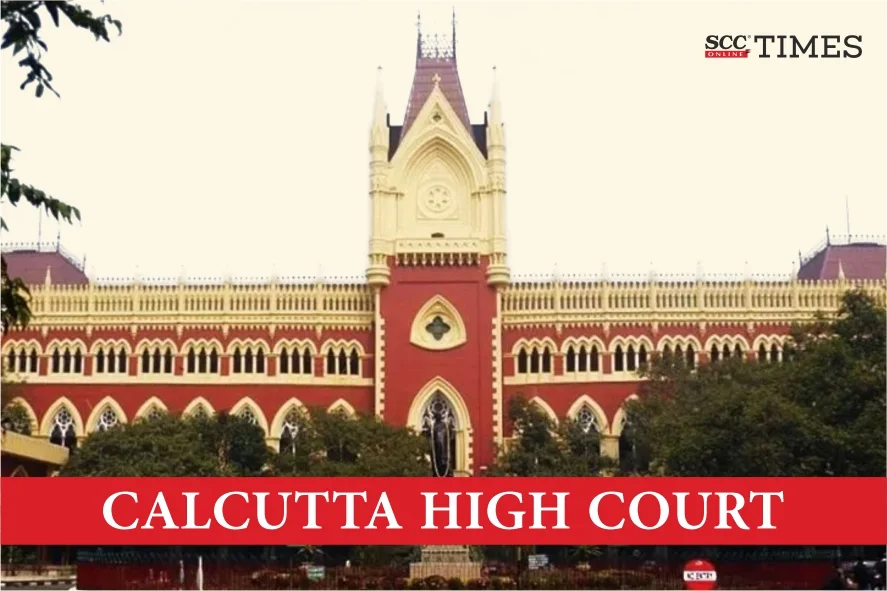Calcutta High Court: In a petition filed by Shamishta Panoli (petitioner), a law student at Symbiosis Law School, Pune, seeking judicial intervention against the registration of FIR(s) and the arrest carried out pursuant to them alleging procedural impropriety, violation of fundamental rights under Article 22(1) of the Constitution, and interim bail. Raja Basu Chowdhury. J., granted her bail as offences alleged were bailable or punishable with less than seven years and that the petitioner was a young student with no risk of tampering with evidence.
The dispute originated with a complaint dated 14-05-2025, addressed to the Officer-in-Charge, Garden Reach Police Station, by a representative of Rashidi Foundation, Kolkata, alleging that the law student had made blasphemous remarks against the Prophet of Islam via social media platforms (Twitter and Instagram), thus hurting religious sentiments. Based on this complaint, FIR was registered at Garden Reach Police Station under Sections 196(1)(a)/299/352/353(1)(c) of the Bharatiya Nagarik Suraksha Sanhita, 2023 (BNSS). The complaint alleged dissemination of objectionable content that went viral on social media and demanded immediate police action.
Subsequent to the FIR, multiple notices were issued to the law student under Sections 35(3) and 94 of BNSS, 2023 on May 20 and May 21, requesting cooperation with the investigation. Police assistance was also sought for conducting raids/searches at the petitioner’s residence, following her alleged non-cooperation. An application for custodial interrogation was filed before the Chief Judicial Magistrate, Alipore, which resulted in issuance of a warrant of arrest on 22-05-2025. The petitioner was ultimately arrested from Gurugram, Haryana, on 30-05-2025, and produced before the Judicial Magistrate, Gurugram, who permitted transit remand till June 3. She was subsequently brought before the Chief Judicial Magistrate, Alipore, where both her bail and further police remand applications were rejected.
The Court expressed serious concern over the mechanical way the warrant had been issued. The Magistrate’s order dated 22-05-2025 granted liberty to the Investigating Officer to arrest, without recording satisfaction on the necessity of such arrest, as mandated by precedent. The warrant did not articulate reasons or satisfaction and ignored the safeguards set out in Arnesh Kumar v. State of Bihar, (2014) 8 SCC 273, which emphasized that arrests for offences punishable by imprisonment less than seven years require strict compliance with procedural checks.
The Court highlighted that the FIR and complaint lacked clarity on the actual statements made by the petitioner that were allegedly offensive. This omission, coupled with the absence of materials evidencing the intent or effect of such statements, brought into question the very foundation of the arrest. The decision relied on Vihaan Kumar v. State of Haryana 2025 SCC Online SC 269, where the Supreme Court had unequivocally held that communication of arrest grounds must be clear, detailed, and comprehensible to the accused. A mere reference to an existing warrant without detailing the offence or facts fails this test.
In addition, the Court emphasized the need to protect personal liberty considering Arnab Goswami v. State of Maharashtra, (2021) 2 SCC 427. Given that the petitioner’s arrest, remand, and the warrant’s validity were questionable, and considering the absence of risk of tampering with evidence (her electronic devices had already been seized), the Court held that custodial interrogation was not warranted.
Accordingly, the Court granted interim bail to the law student upon execution of a bond of ₹10,000 to the satisfaction of the Chief Judicial Magistrate, Alipore. The conditions imposed included: cooperation with investigation, bar on international travel without prior leave, and no tampering with evidence or witness intimidation. It was clarified that the Investigating Officer should avoid unnecessary summons and consider the petitioner’s academic commitments. Furthermore, the State was directed to ensure police protection to the petitioner in light of the threats she reported.
Thus, it was held that the arrest procedure would be further examined upon affidavit of exchange. The Court refused the Advocate General’s post-judgment request for stay of operation.
[Shamishta Panoli v. State of West Bengal, W.P.A. 12361 of 2025, decided on 05-05-2025]
Advocates who appeared in this case:
Mr. D.P. Singh, Sr. Adv., Mr. Nilanjan Bhattacharjee, Sr. Adv., Mr. Rajdeep Majumder, Sr. Adv., Mr. Kabir Shankar Bose, Mr. Brajesh Jha, Mr. Vikash Singh, Mr. Satadru Lahiri, Mr. Mayukh Mukherjee, Mr. Mannu Mishra, Ms. Arushi Rathode, Ms. Kanchan Jaju, Mr. Sudarshan Kumar Agarwal, Ms. Vanshika Lamba, Mr. Rahul Verma, Ms. Ditsha Dhar, Mr. Ditsha Dhar, Ms. Tejasuri Jatt, Mr. Soumya Sarkar, Ms. Sagnika Banerjee Mr. Debanea Das, Ms. Swheta Maity ……for the Petitioner
Mr. Kishore Dutta, Ld. A.G., Mr. Swapan Banerjee, Ms. Sumitra Slaeni, Mr. Diptendra Narayan Banerjee, Mr. Arka Kumar Nag, Mr. Soumen Chatterjee, …for the State








